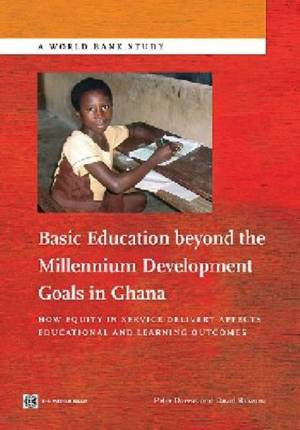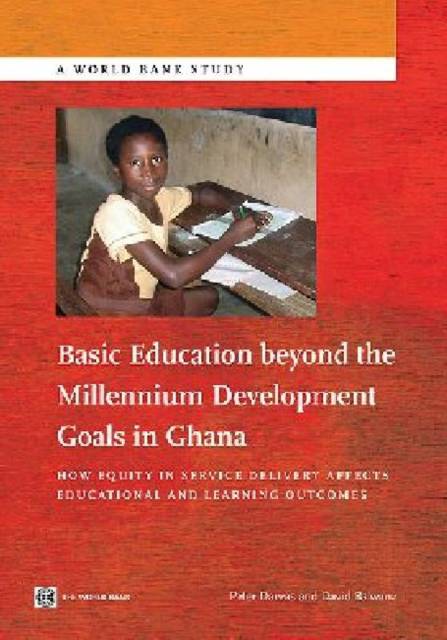
- Retrait gratuit dans votre magasin Club
- 7.000.000 titres dans notre catalogue
- Payer en toute sécurité
- Toujours un magasin près de chez vous
- Retrait gratuit dans votre magasin Club
- 7.000.000 titres dans notre catalogue
- Payer en toute sécurité
- Toujours un magasin près de chez vous
Basic Education Beyond the Millennium Development Goals in Ghana
How Equity in Service Delivery Affects Educational and Learning Outcomes
Peter Darvas, David Balwanz
44,45 €
+ 88 points
Description
"Inequity is the central challenge facing basic education in Ghana and undercuts the potential contribution of basic education to Ghana's national development goals. Persistent disparities in education service delivery and inequitable allocation of resources in Ghana lead to highly inequitable educational outcomes. These inequities negatively affect system quality, efficiency and accountability and ultimately undermine broader national development. Wide-spread inequity in education service delivery significantly depresses system learning outcomes. This report describes a "missing middle" in terms of learning outcomes: While a small number of children perform well, the majority of pupils (more than 60%) pass through primary school without becoming proficient in numeracy and literacy. Specifically, children from Ghana's northern regions and deprived districts, poor and rural households and ethnic and linguistic minorities - students who require the most support to meet learning outcomes - receive, on average, disproportionately fewer resources from the government than their peers. Systemic inequities create this missing middle and drag down system performance. Following a decade of rapid change, as of 2013, more children are attending basic and senior high schools than at any time in the history of Ghana. In the past decade, Ghana has realized great growth, progress and change. Population growth, urbanization and significant GDP growth have changed the economic, political and social landscape of Ghana. In the past decade, incidence of extreme poverty has been cut in half. Introduction of Free, Compulsory, Universal Basic Education (FCUBE) and kindergarten has supported a near doubling of basic education enrollment in the past 15 years. Delivering basic education and ensuring equity has become more challenging. Compared to a decade ago, more stakeholders are involved in allocating and managing core education inputs and accountability systems remain unclear and weak. Addressing the deeply embedded inequities (e.g. allocation of trained teachers, support to deprived districts and populations) is further complicated by a complex and fragmented policy, management and financing environment. The persistence of inequity reflects the persistence of conflicting sector interests and poses genuine policy dilemmas. However, recent experience shows that accelerating progress toward equity and quality basic education for all is possible. Several recent initiatives in Ghana point to the possibility of improving equitable resource allocation, strengthening social protection and providing additional support to improve learning outcomes. For example, children with below-average learning outcomes in poorly resourced environments are likely to show measurable gains when provided additional support (e.g. instructional support, learning resources, management support, demand-side incentives). "
Spécifications
Parties prenantes
- Auteur(s) :
- Editeur:
Contenu
- Nombre de pages :
- 182
- Langue:
- Anglais
- Collection :
Caractéristiques
- EAN:
- 9781464800986
- Date de parution :
- 28-11-13
- Format:
- Livre broché
- Format numérique:
- Trade paperback (VS)
- Dimensions :
- 178 mm x 254 mm
- Poids :
- 331 g







